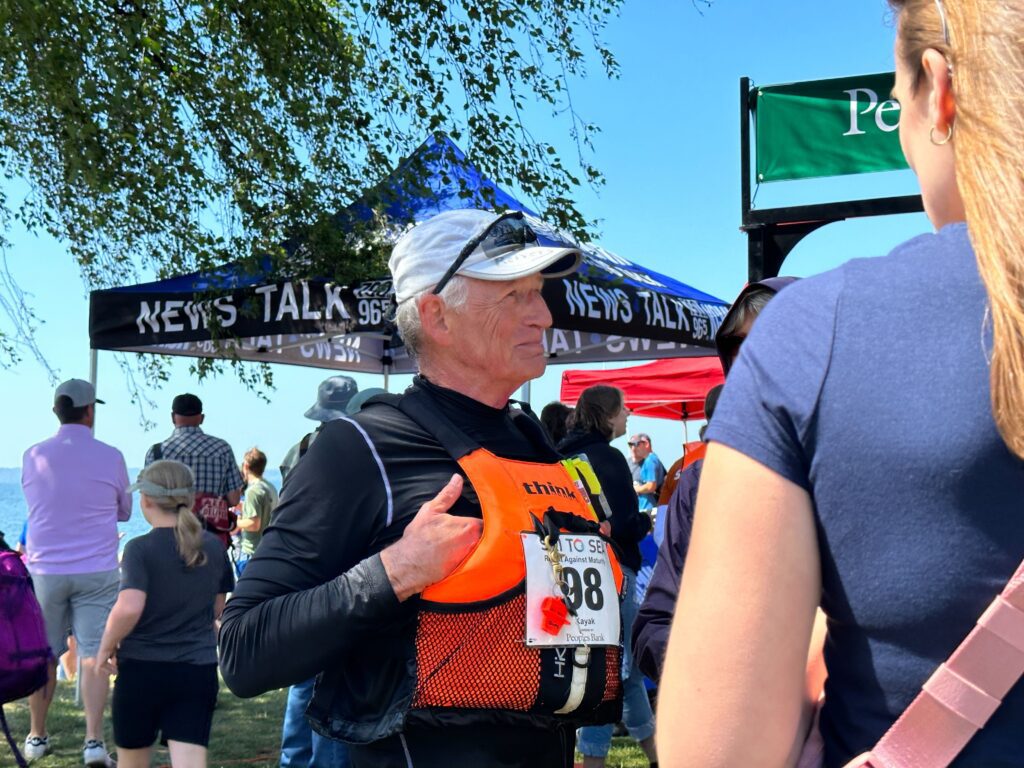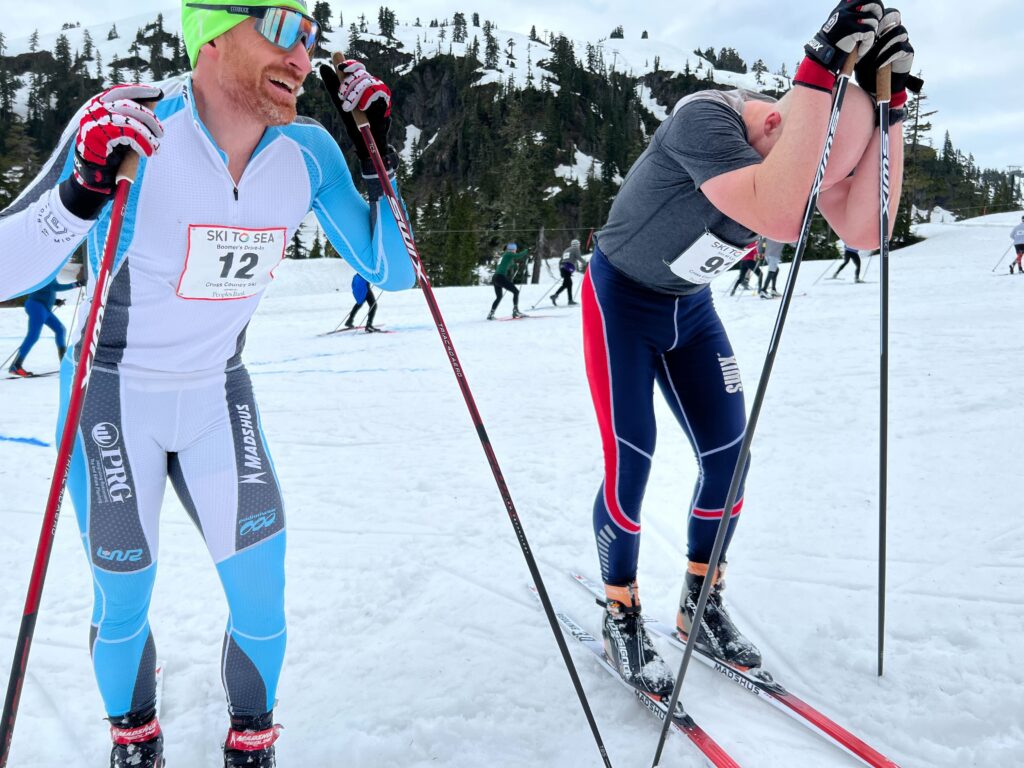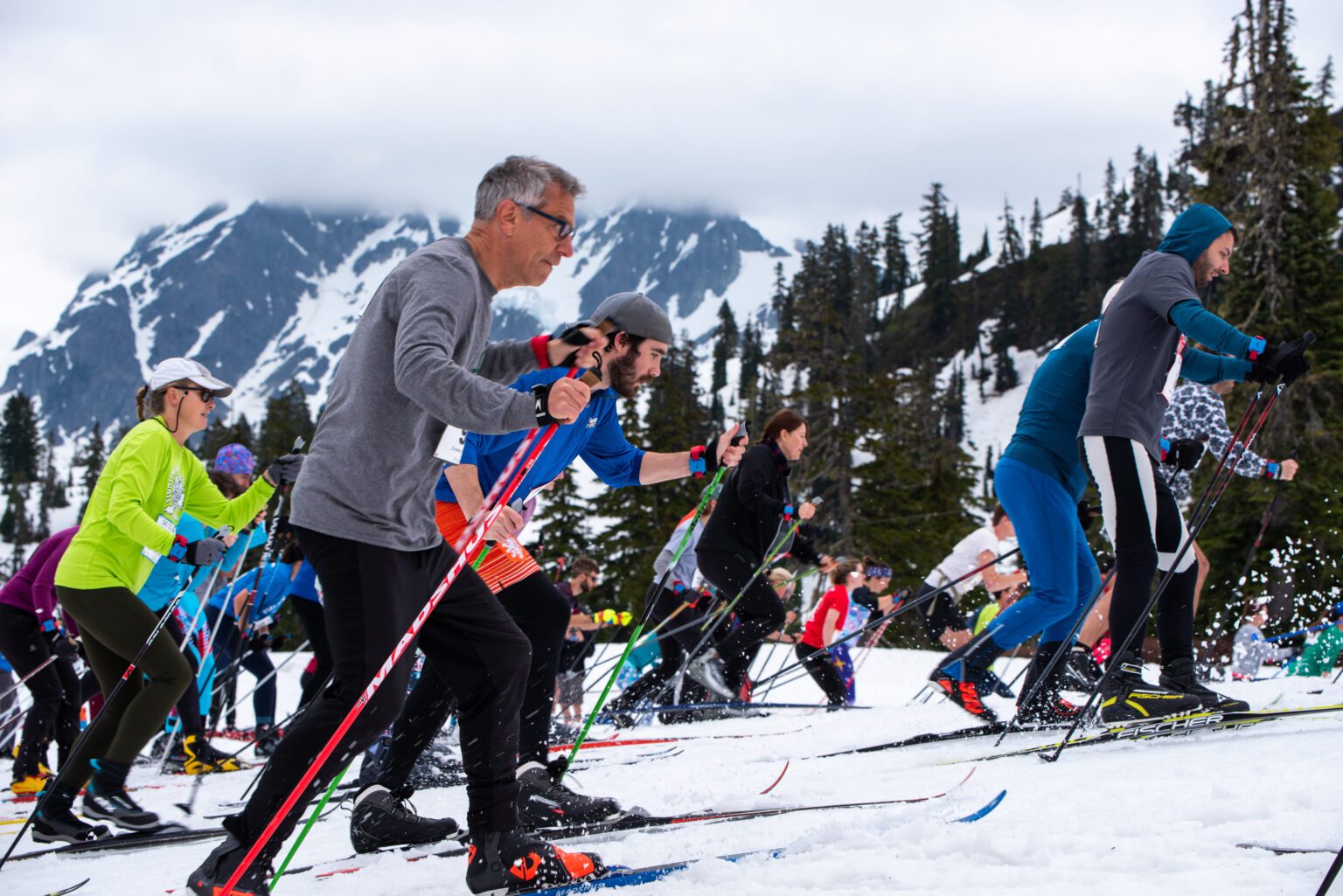Every leg of Ski to Sea is grueling in its own right. Racers were slipping and eating snow on the cross-country ski leg, straining to gain elevation in snow boots on the downhill ski leg, making sure their knees stayed intact on the running leg, battling unforeseen inclines on their road bikes, keeping upright in canoes, navigating obstacles on the cyclocross course or fighting headwinds on Bellingham Bay.
Not to mention, the participants of the multi-sport relay race are a mix of professional athletes and casual recreationists who may hit the gym once per week.
So how do they recover? Cascadia Daily News asked a number of Sunday’s competitors about their post-race plans.
Seth Fleetwood, Ski to Sea veteran and Bellingham’s mayor, was exhilarated after participating in his 31st race. He was also glad it was over, he said, after coming off the cross-country course.
“Everyone goes up to the parking lot — it’s like a tailgate party,” Fleetwood said when asked about his recovery plans. “For an hour and a half, you’re just hanging out and feeling good because we got another Ski to Sea out of the way.”
Pedro Bojorquez, 16, was the runner on the mayor’s “City Haul” team. Bojorquez is a cross country and track and field athlete at Squalicum High School, but the 8-mile run would be his longest-ever competitive race, he said. The young runner expected to head straight into recovery mode after finishing his leg.
“If I get motivated, I might take a dip in the water,” he said, referring to a rumor he had heard that runners hit the Nooksack River after they’re finished.

After ringing the finish line bells, Reivers Dustin, the 72-year-old kayaker for Revolt Against Maturity, said he would indulge in chocolate bars and ice cream to recuperate.
While the wind made the course “a little tougher than usual,” Dustin said he and his friends race each other and work out together year-round.
Another kayaker, Wilson Reavley of team My Dog, said after paddling hard, he planned to go to Prime Sports Institute in Bellingham to recover.

Makayla Hunt, 28, of Kenmore was the downhill skier for the team Dirty 30. Hunt just started skiing last year, she said, and while she went into her leg with some trepidation about the hike up the hill, she didn’t think she needed to do anything out of the ordinary to recover.
“I’ll have a hazy pale ale,” she said.
Mathias Newell, 32, was Dirty 30’s runner. (The average age of team members was 30 — hence the name.) Newell said he would hop on a bike after finishing his 8-mile run. “It’s always best to recover with an activity,” he said.
Team Well Hung Over’s cyclocross racer Mac Hamill, 26, experienced a hectic end to his leg when he couldn’t find the team’s kayaker, Keenan Elliott. About six minutes later, Elliott stumbled over for the handoff. Hamill later joked his teammate was probably hungover.
Hamill’s post-race plans involved making birria tacos and, of course, living up to his team’s name.

Brian Gregg, the ex-Olympian skier who finished first in the cross-country leg, said that after “a couple good drinks of water,” he would connect with some of his skiing buddies and “ski up to the top, take in the views and enjoy the last snow of spring.”
Andrew Shelton, the 37-year-old downhill skier for the team Late Bloomers, thought he might “sit in a tub” after his leg.
Shelton said he trained by setting the treadmill at Bellingham Training & Tennis Club to “fat burn.”
“Carrying the extra 11 pounds after COVID doesn’t help,” he said.
Adam Loomis, 31, the professional skier who carried Birch Equipment from fourth to first place during his leg, said the downhill run at Mount Baker was “pretty hard” but maybe not all that arduous. To cool down, Loomis said, he would “cheer on his teammates and have a few beers.”

Deb Gordon, 64, moved from Wisconsin to Bellingham last year with her husband Mark, 67. While this was the first Ski to Sea for both of them, both were accomplished cross-country skiers. Mark Gordon, who skied for Green Eggs and Bellingham, was a regular in a famous 30-mile race called the American Birkebeiner, which finished in Hayward, Wisconsin.
To recover, Mark Gordon said he would usually hit the scene on Hayward’s Main Street after the race. His wife Deb, who skied for Oldies but New-Bees, had a similar idea for her post-Ski to Sea activity.
“I’m going to celebrate life with my friends and have a beer,” she said.




